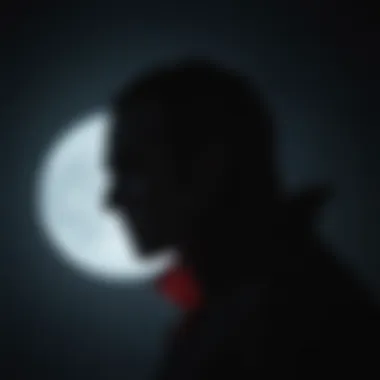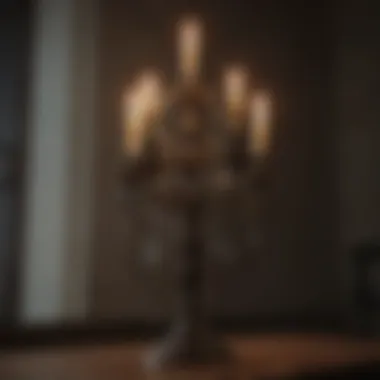Unveiling the Depths of 'Interview with a Vampire' by Anne Rice: A Critical Analysis


Industry Insights
The world of vampire literature has long been a captivating subject for enthusiasts of dark fiction. Anne Rice's 'Interview with a Vampire' stands out as a timeless masterpiece that delves into themes of immortality, morality, and existentialism. Unlike traditional vampire tales, Rice's work offers a unique perspective that intrigues readers with its philosophical underpinnings and multidimensional characters.
In delving into the exploration of 'Interview with a Vampire,' it is essential to analyze the impact of this novel not just on the literary world but also on popular culture at large. The resurgence of interest in vampire-themed entertainment, from movies to TV shows, can be partially credited to Rice's influential work. Through a detailed examination of this novel, readers can gain a deeper understanding of how it has shaped the portrayal of vampires in contemporary media and art forms.
Reviews & Recommendations
A review of 'Interview with a Vampire' by Anne Rice is not simply a critique of a novel but an exploration of themes and character development that have set a standard in the vampire genre. Rice's intricate storytelling and nuanced portrayal of immortal beings have cemented this novel as a must-read for fans of gothic literature. By dissecting the complex relationships between the main characters, such as Louis and Lestat, readers can unravel the layers of emotional depth and moral ambiguity that drive the narrative forward.
For those seeking recommendations within the vampire fiction realm, 'Interview with a Vampire' undoubtedly takes a top spot. Its influence on subsequent vampire literature cannot be overstated, making it a foundational read for those interested in exploring the genre further. Fans of dark fantasy, subtle horror, and philosophical introspection will find themselves enthralled by Rice's masterful storytelling and thought-provoking exploration of immortality.
News & Updates
As a cornerstone of vampire literature, 'Interview with a Vampire' continues to make waves in popular culture, with news and updates surrounding adaptations, spin-offs, and tributes to Rice's work. Keep abreast of any breaking news in the literary world related to this monumental novel, including potential casting announcements, reboots, or multimedia projects that pay homage to its legacy. Stay tuned to discover the latest releases, trailers, and events that celebrate the enduring impact of 'Interview with a Vampire' on contemporary storytelling.
Feature Articles
Dive deeper into the world created by Anne Rice in 'Interview with a Vampire' through feature articles that unpack the cultural, philosophical, and literary significance of this iconic work. Explore the thematic resonances of immortality, the intricacies of vampire lore, and the ethical dilemmas faced by timeless beings. Delve into analyses of key characters like Claudia and Armand, shedding light on their motivations and contributions to the overarching narrative. By engaging with these feature articles, readers can gain a comprehensive understanding of the enduring relevance of 'Interview with a Vampire' in the landscape of modern literature.
Introduction
In this section, we embark on a profound exploration of Anne Rice's 'Interview with a Vampire,' a literary masterpiece that holds significant acclaim within the realm of vampire literature. Delving into the intricate layers of this novel, we aim to dissect the core themes of immortality, morality, and existentialism that are interwoven throughout the narrative. By scrutinizing the characters, narrative structure, and the profound impact of this work, readers will gain a comprehensive insight into the multifaceted brilliance of 'Interview with a Vampire.' This section sets the stage for a meticulous analysis that will unravel the profound artistry and depth of Anne Rice's creation.
Brief Overview of Anne Rice
Anne Rice, a luminary in the realm of gothic fiction, emerges as a formidable figure in the literary world. Her unique storytelling prowess and evocative writing style have garnered her a devoted following. Renowned for her imaginative vision and the ability to craft immersive narratives, Rice's works captivate readers with their blend of darkness, mystique, and emotional depth. As we delve into the depths of 'Interview with a Vampire,' understanding Rice's background becomes essential to unraveling the nuances of this seminal work. By examining her influences, writing style, and thematic preferences, we gain valuable insights into the genius behind one of the most celebrated vampire novels of all time.
Background of 'Interview with a Vampire'
Set against the backdrop of 18th-century New Orleans, 'Interview with a Vampire' immerses readers in a world where immortality and human frailty collide. The novel traces the enthralling journey of Louis de Pointe du Lac, a tormented vampire entangled in a web of moral dilemmas and existential contemplations. Anne Rice's masterful storytelling transports us to a realm where darkness reigns, and the boundaries between good and evil blur. By delving into the historical context, cultural influences, and the author's own experiences, we unravel the tapestry of emotions and philosophies that underpin this haunting tale.
Significance in Vampire Literature


'Interview with a Vampire' stands as a seminal work in vampire literature, reshaping the conventions of the genre and elevating it to new heights of sophistication. Rice's portrayal of vampires as complex, introspective beings challenged traditional archetypes, breathing fresh life into a genre often steeped in cliches. Through an exploration of immortality, morality, and the eternal quest for identity, the novel delves deep into the human psyche, prompting readers to ponder profound questions about life, death, and the nature of existence. The significance of 'Interview with a Vampire' extends beyond its literary merits, sparking debates and discussions that continue to resonate with audiences across the globe.
Character Analysis
Character analysis holds paramount importance in this exploration of 'Interview with a Vampire' by Anne Rice. By dissecting the intricacies of each character, readers gain profound insights into the narrative's depth and the thematic undercurrents propelling the storyline. Understanding the motives, conflicts, and transformations of key characters not only enhances the reader's engagement but also unravels layers of symbolism and allegory woven into the fabric of the novel.
Louis de Pointe du Lac
Louis de Pointe du Lac, a pivotal character in 'Interview with a Vampire,' embodies a profound sense of melancholy and existential questioning. His journey from human life to immortality encapsulates themes of loss, longing, and the nature of humanity. Delving into Louis' psyche unveils the internal struggles and moral dilemmas that shape his interactions with other characters, particularly Lestat and Claudia, offering a lens through which readers can contemplate the complexities of immortality and its repercussions.
Lestat de Lioncourt
Lestat de Lioncourt, the charismatic and enigmatic vampire, presents a stark contrast to Louis' contemplative nature. With his flamboyance and unapologetic embrace of vampiric existence, Lestat challenges conventional notions of morality and ethics. Exploring Lestat's character delves into themes of power, dominance, and the eternal conflict between good and evil, inviting readers to ponder the seductive allure of immortality and the consequences of wielding such power.
Claudia
Claudia, the immortal child trapped in a vampire's body, serves as a poignant symbol of innocence corrupted by eternal life. Her character arc traverses dark territories of manipulation, desire, and a longing for maternal love. Examining Claudia's character unlocks discussions on the blurred boundaries between adulthood and childhood, the essence of identity, and the haunting implications of being forever frozen in time.
Armand
Armand, the enigmatic leader of the Theatre des Vampires, imposes a sense of mystery and authority within the vampire community. His intellectual demeanor and ancient wisdom add layers of intrigue to the narrative landscape, offering a glimpse into the historical tapestry of vampire lore and the clashes between old-world traditions and newfound ideologies. Analyzing Armand's character elucidates themes of hierarchy, loyalty, and the cyclical nature of power dynamics in the vampire realm.
Themes Explored
Exploring the themes in Anne Rice's 'Interview with a Vampire' is paramount to unraveling the intricate layers of this iconic work of literature. In this article, we delve into the thematic essence that underpins the narrative, shedding light on the profound insights it offers. Themes such as immortality, morality, and existentialism permeate the text, guiding readers through a philosophical maze that challenges conventional beliefs and provokes contemplation.
Immortality and Its Consequences
The exploration of immortality in 'Interview with a Vampire' transcends mere longevity to delving into the profound ramifications of living an eternal existence. Through characters like Louis de Pointe du Lac and Lestat de Lioncourt, Anne Rice intricately examines the psychological and emotional toll of immortality, highlighting the existential angst and perpetual solitude that accompanies everlasting life. Immortality becomes a double-edged sword, bestowing endless time while stripping away the essence of humanity, leading to a poignant reflection on the price one pays for eternal survival.
Morality and Ethics
The theme of morality and ethics in 'Interview with a Vampire' serves as a moral compass navigating the murky waters of immortality. Anne Rice challenges conventional morality by exploring the moral dilemmas faced by vampires who must grapple with their insatiable thirst for blood and the consequences of their predatory nature. Through the character of Louis, readers are confronted with complex ethical questions, blurring the lines between good and evil, right and wrong. Morality becomes a fragile construct, tested by the unyielding demands of a vampiric existence, prompting a critical examination of human righteousness and the inherent darkness within us all.
Existentialism and Identity


In 'Interview with a Vampire,' existentialism and identity intertwine, weaving a narrative tapestry that unravels the essence of being and selfhood. Anne Rice delves into the existential angst of her characters, navigating the existential void that arises from confronting eternal life. The search for meaning, purpose, and individual identity takes center stage, as vampires grapple with the existential burden of immortality. Through introspective dialogue and profound introspection, Rice invites readers to contemplate the existential quandaries that plague the immortal soul, posing profound questions about the nature of existence and the pursuit of self-discovery.
Narrative Structure
In this section, we delve into the intricate narrative structure of Anne Rice's 'Interview with a Vampire,' a crucial aspect that intricately weaves together the fabric of the story. The narrative structure is a fundamental element that dictates how the plot unfolds, offering readers a unique perspective into the characters' lives and interactions. By dissecting the narrative structure, we gain insight into the temporal sequencing, plot development, and character dynamics that shape the overall reading experience.
The significance of the narrative structure lies in its ability to engage readers on a multi-dimensional level, guiding them through the tangled web of vampiric existence portrayed in the novel. Through careful analysis of the narrative arc, subplots, and character perspectives, we uncover the underlying themes of immortality, morality, and existentialism that define the narrative landscape. The benefits of exploring the narrative structure include a deeper appreciation for the author's storytelling prowess, a nuanced understanding of character motivations, and a heightened sense of immersion in the dark and mysterious world of vampires.
Considerations about narrative structure extend to the intricacies of point of view, timeline manipulation, and thematic coherence. By examining how Anne Rice meticulously constructs her narrative, we decipher the layers of complexity that enrich the reading experience and elevate the novel beyond mere vampire folklore.
Multiple Perspectives
Within 'Interview with a Vampire,' the utilization of multiple perspectives adds a layer of richness and depth to the storytelling. Through the eyes of different characters, namely Louis de Pointe du Lac, Lestat de Lioncourt, Claudia, and Armand, readers are exposed to diverse viewpoints and interpretations of vampiric existence. Each character brings forth their unique narrative voice, shedding light on their individual struggles, desires, and moral quandaries.
The incorporation of multiple perspectives serves to challenge readers to confront their preconceived notions of good and evil, immortality, and the nature of humanity itself. By juxtaposing contrasting viewpoints, Anne Rice prompts readers to question the conventional norms of society and explore the shades of grey that permeate the vampire mythos. This narrative technique not only adds complexity to the characterization but also allows for a more holistic understanding of the existential dilemmas faced by immortal beings.
Historical Context
To fully grasp the nuances of 'Interview with a Vampire,' it is imperative to consider the historical backdrop against which the narrative unfolds. Set against the lush tapestry of 18th-century New Orleans and other exotic locales, the novel immerses readers in a bygone era characterized by decadence, spiritual upheaval, and societal taboos.
The historical context not only serves as a backdrop for the characters' adventures but also influences their choices, beliefs, and interactions with the mortal world. By exploring the cultural norms, political landscapes, and religious tensions of the time, readers gain a deeper appreciation for the challenges faced by the immortal protagonists as they navigate through the complexities of human history.
It is through this historical lens that 'Interview with a Vampire' transcends mere supernatural storytelling, evolving into a poignant reflection on the enduring themes of love, loss, and the eternal quest for meaning in a world fraught with darkness and light.
Critical Reception
In delving into the critical reception of Anne Rice's 'Interview with a Vampire,' it is imperative to grasp the vital role that reviews and analyses play in shaping the overall perception and understanding of literary works. The reception of a piece of literature, especially one as iconic as 'Interview with a Vampire,' serves as a barometer of its impact and influence on readers and critics alike. Critics' interpretations and evaluations not only reflect the reception of the novel in its time but also contribute to its enduring legacy and significance in the realm of vampire literature. By dissecting the critical reception of this novel, we can gain valuable insights into the intricate layers of themes, characters, and narrative presented by Anne Rice.
Literary Achievements
The literary achievements of 'Interview with a Vampire' by Anne Rice are profound and multi-faceted, positioning the novel as a groundbreaking work in the genre of vampire fiction. Rice's masterful storytelling, rich character development, and exploration of complex themes such as immortality, morality, and existentialism have solidified the novel's place in literary history. One of the key literary achievements of the novel is its ability to humanize vampires, imbuing them with emotions, desires, and struggles that resonate with readers on a deep and meaningful level. Through her portrayal of immortal beings grappling with eternal existence, Rice challenges traditional vampire stereotypes and transcends cliches, creating a narrative that is both gripping and thought-provoking.
Controversies and Debates
Despite its acclaim, 'Interview with a Vampire' by Anne Rice has sparked its share of controversies and debates within literary circles. One of the primary areas of contention revolves around the novel's treatment of sensitive topics such as morality, religion, and the nature of evil. Some critics argue that Rice's exploration of these themes is too provocative or controversial, pushing the boundaries of conventional literary norms. Additionally, debates have arisen regarding the portrayal of vampire mythology and its departure from traditional tropes. By scrutinizing these controversies and debates surrounding the novel, we can gain a deeper understanding of the multidimensional nature of Rice's work and its impact on readers and critics over the years.


Cinematic Adaptations
In the realm of exploring Anne Rice's 'Interview with a Vampire,' the aspect of Cinematic Adaptations emerges as a pivotal juncture that delves into the visual reinterpretation of the novel. Cinematic adaptations play a crucial role in bridging the gap between literature and screen, offering a unique perspective that enhances the audience's engagement with the story. The adaptation of literary works into movies opens a new dimension of storytelling, allowing viewers to witness the characters and themes in a vivid and dynamic format. In the case of 'Interview with a Vampire,' the cinematic adaptations bring to life the intricate relationships, moral dilemmas, and gothic atmosphere envisioned by Anne Rice, offering a visually captivating experience for audiences to immerse themselves in.
Interview with a Vampire ()
The adaptation of 'Interview with a Vampire' into a movie in 1994 marked a significant moment in cinematic history, as it brought Anne Rice's dark and compelling narrative to the silver screen with remarkable precision. Directed by Neil Jordan, the film captured the essence of the novel, translating the melancholic journey of Louis and Lestat onto celluloid with haunting visuals and a mesmerizing atmosphere. The stellar performances by actors such as Tom Cruise and Brad Pitt added depth to the characters, portraying their inner turmoil and complex dynamics with finesse. 'Interview with a Vampire' (1994) remains a standout adaptation that stays true to the thematic core of the novel while offering a visually stunning interpretation that captivates viewers with its atmospheric richness and emotional depth.
Queen of the Damned ()
Following the success of 'Interview with a Vampire,' 'Queen of the Damned' continued the cinematic exploration of Anne Rice's Vampire Chronicles in 2002. While deviating from the source material to some extent, the film retained the gothic allure and dark mystique that define Rice's vampire universe. Starring Stuart Townsend as the infamous vampire Lestat, 'Queen of the Damned' embraced a more modern and edgy aesthetic, appealing to a new generation of viewers while maintaining the timeless appeal of its predecessor. Despite mixed reviews, the film contributed to expanding the cinematic portrayal of Anne Rice's vampire mythology, adding layers of intrigue and intensity to the overarching narrative. 'Queen of the Damned' (2002) stands as a bold continuation of Rice's legacy in film adaptation, offering a fresh perspective on the immortal characters and intricate relationships that define her captivating world.
Legacy and Influence
When delving into the legacy and influence of Anne Rice's 'Interview with a Vampire,' one cannot overlook its profound impact on the landscape of vampire literature and popular culture. The sheer longevity of the novel's relevance speaks volumes about its enduring legacy in the literary world. Anne Rice's masterpiece has paved the way for a new era of vampire storytelling, influencing countless authors and creators in the genre to dive deeper into the complexities of immortality, morality, and existentialism. The influence of 'Interview with a Vampire' transcends time and geographical boundaries, resonating with readers and enthusiasts globally.
Impact on Pop Culture
Anne Rice's 'Interview with a Vampire' has left an indelible mark on popular culture, infiltrating various entertainment mediums and captivating audiences with its dark and intriguing narrative. The novel's impact on pop culture can be observed through its adaptation into a highly successful 1994 film, introducing a new generation of fans to the mesmerizing world of vampires. The legacy of 'Interview with a Vampire' extends beyond literature, inspiring an array of TV shows, movies, and even video games that explore similar themes of immortality and existential quandaries.
Literary Inspirations
Through the lens of literary inspirations, one can appreciate the profound impact of Anne Rice's 'Interview with a Vampire' on contemporary writers and the evolution of vampire literature. Rice's masterful storytelling and exploration of deep philosophical themes have served as a wellspring of inspiration for aspiring authors seeking to delve into the intricacies of character development and existential dilemmas. 'Interview with a Vampire' stands as a testament to the power of literature to transcend genres and spark creativity in the minds of future literary luminaries, leaving an indelible mark on the landscape of contemporary fiction.
Conclusion
In the intricate web of 'Interview with a Vampire,' the concluding thoughts serve as the anchor that ties together the multifaceted elements explored throughout this comprehensive article on Anne Rice's iconic work. Reflecting on the significance of the conclusion reveals its pivotal role in synthesizing the overarching themes of immortality, morality, and existentialism. By delving deep into the culmination of the narrative, readers gain a profound understanding of how these themes interconnect, resonating through the intricate character dynamics and thought-provoking philosophical undertones that characterize the novel.
Highlighting the essence of the conclusion underscores its role in encapsulating the thematic richness and depth that permeates 'Interview with a Vampire.' By drawing the threads of immortality's consequences, ethical dilemmas, and existential ponderings, the conclusion encapsulates the essence that makes this work a timeless masterpiece in the realm of vampire literature. Furthermore, it gestures towards the enduring impact of Rice's narrative craftsmanship in provoking introspection and contemplation among readers, elevating the novel beyond mere entertainment to a profound exploration of the human condition.
The allure of the conclusion lies in its ability to leave a lingering resonance, prompting readers to revisit and reconsider the profound insights unveiled throughout the journey of 'Interview with a Vampire.' It serves as a testament to the enduring power of literature to provoke thought, evoke emotions, and transcend temporal boundaries to speak to universal truths that resonate with audiences across generations.
Enduring Appeal of 'Interview with a Vampire'
Unveiling the enduring appeal of 'Interview with a Vampire' delves into the core essence that captivates readers and sustains its legacy in the annals of literary history. At its heart, the enduring appeal of this iconic work lies in its ability to transcend conventional genre boundaries, offering a nuanced exploration of immortality, morality, and existential quandaries through the nuanced interplay of complex characters and layered narratives.
The enduring appeal of 'Interview with a Vampire' is rooted in its timeless relevance, as it grapples with perennial questions of existence, ethics, and the human experience. Through the lens of immortal beings navigating the complexities of their eternal existence, readers are invited to ponder profound inquiries about the nature of life, death, and identity, transcending the confines of traditional vampire lore to confront deeper philosophical conundrums.
Anne Rice's magnum opus endures not only for its thematic depth but also for its masterful storytelling that weaves a rich tapestry of emotions, intrigue, and ethical dilemmas. The exploration of immortal characters grappling with the weight of their choices and the consequences of their actions resonates with audiences by tapping into universal themes of redemption, loss, and the pursuit of meaning in a tumultuous world.
In essence, the enduring appeal of 'Interview with a Vampire' lies in its ability to transcend the boundaries of traditional vampire fiction, transcending into a profound meditation on the complexities of the human condition and the timeless quest for understanding the enigma of existence.



